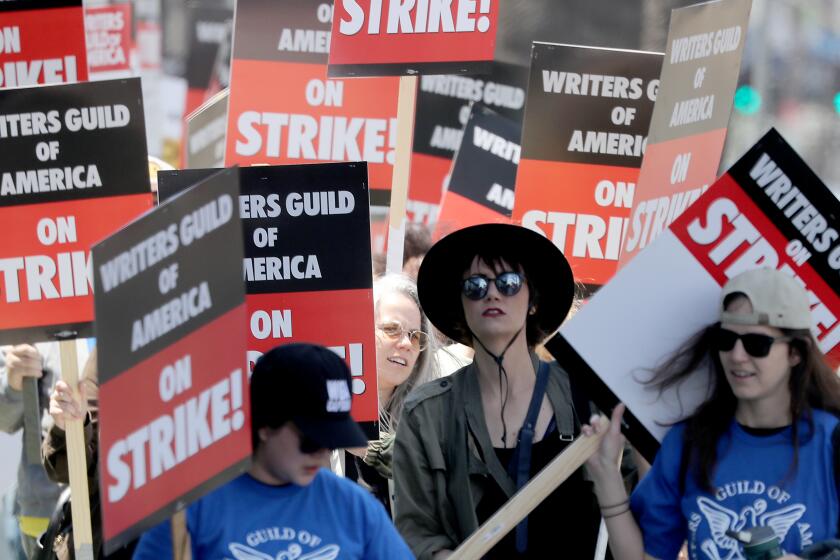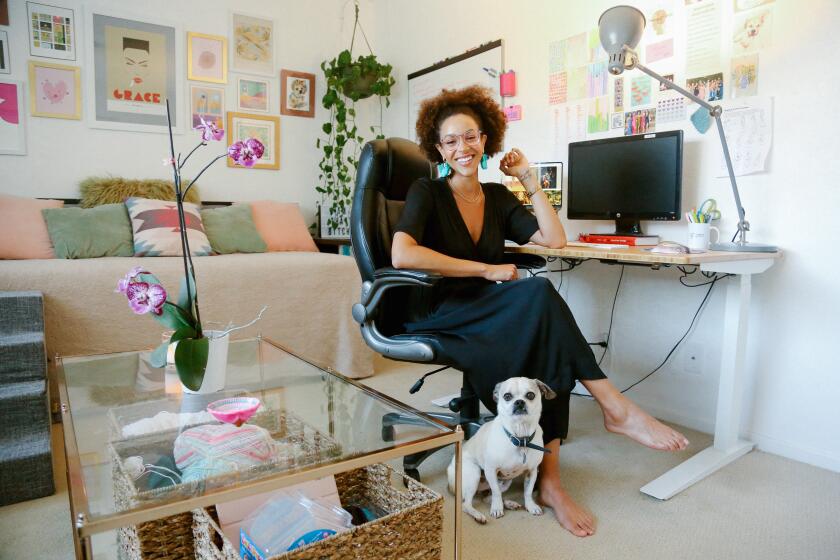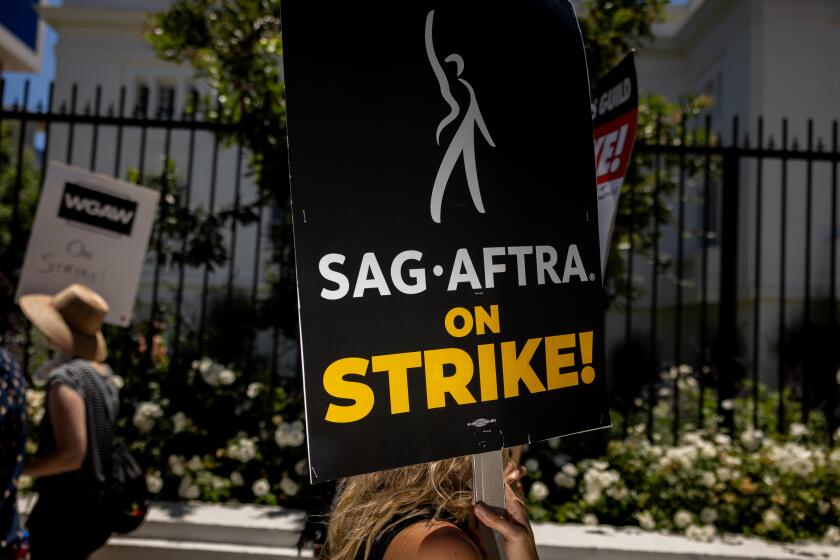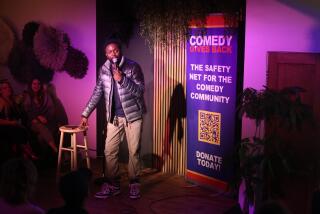With free screenwriting workshops, striking Hollywood writers look to raise spirits and funds
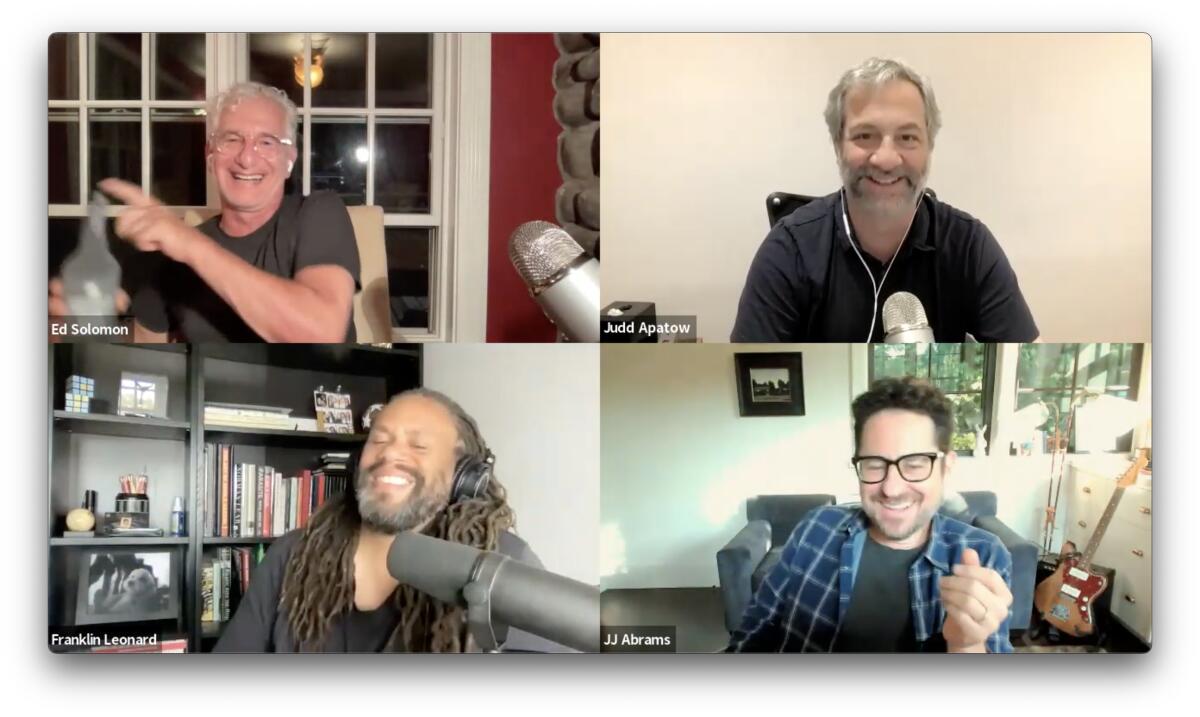
- Share via
When some 11,500 members of the Writers Guild of America went on strike in early May, screenwriter Ed Solomon, like so many of his peers, worried about his creative juices stagnating.
During the two previous writers strikes, in 1988 and 2008, Solomon — whose credits include “Bill & Ted’s Excellent Adventure,” “Men in Black” and “Now You See Me” — had taken classes, enrolling in a film school summer session and a series of fiction writing workshops.
“I was thinking, ‘What can I take that would keep sort of poking me?’” he says. “I was just hoping to keep pushing myself and challenging myself.”
As he looked around for similarly stimulating courses earlier this year, Solomon realized that, having worked for decades in Hollywood, he already had access to many of the best film and television writers in town.
What if, instead of taking a course, he helped lead one? And what if he offered it for free to other writers as a way to foster a sense of community and raise money to help those adversely affected by the strike?
The 2023 writers’ strike is over after the Writers Guild of America and the Alliance of Motion Picture and Television Producers reached a deal.
On June 10, Solomon pitched the idea to his 94,000 followers on the platform formerly known as Twitter: “If I were to do a series of Zoom workshops during the strike (was thinking Q&A sessions on various parts of the craft of writing), would anyone show up?”
Three months and a dozen workshops later, the answer has proven to be a resounding yes.
Launched in partnership with the Black List, a platform dedicated to empowering Hollywood writers, Solomon’s weekly series, Word by Word, has featured a who’s who of screenwriting luminaries, including Judd Apatow, Jesse Armstrong, Eric Roth, J.J. Abrams, Lena Dunham, Amy Schumer, Liz Hannah, Sharon Horgan, Craig Mazin, Neil Gaiman, Adele Lim, Chris Miller, Phil Lord, Tracy Oliver and Christopher McQuarrie.
Casual and free-flowing, the two-hour sessions jump off from topics like “Fear, Failure, and F—ing Up” and “Outlining: A Necessary Evil?” into open-ended, often startlingly candid conversations about the agonies and ecstasies and nuts-and-bolts mechanics of the writing process.
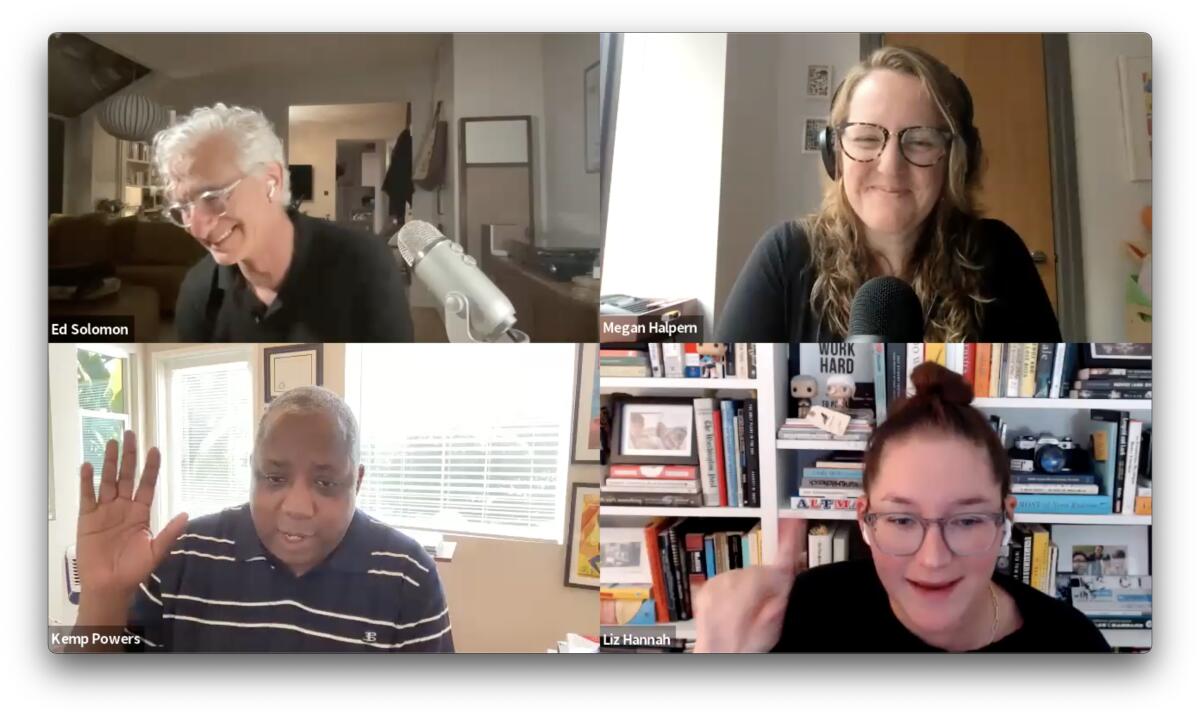
With each new episode of Word by Word — which is primarily aimed at writers but open to anyone at no charge — the audience has steadily grown through social media and word-of-mouth, with more than 1,000 people tuning in for a recent Zoom session featuring Charlie Kaufman and Boots Riley.
By soliciting donations from attendees, Word by Word has so far raised roughly $55,000 for three strike funds — the Union Solidarity Coalition, the Entertainment Community Fund and the Hollywood Support Staff Relief Fund — to help not only writers but also crew members and others affected by the work stoppage.
The impulse to write is strong, as thousands of TV and film writers in the WGA are discovering while on strike. Might as well tell a hen to not lay eggs.
As soon as he saw Solomon’s tweet, Franklin Leonard, who launched the Black List in 2005 to spotlight the best unproduced screenplays, knew he wanted to get involved. Within moments, Leonard sent Solomon a direct message to start figuring out how they could collaborate. With the help of Black List senior vice president Megan Halpern and others on the company’s team, Word by Word was up and running two weeks later, with Susanna Fogel and Lena Dunham as its first guests.
“My team and I feel very lucky be in this position where we can continue to do the work we’re doing to support the writing community,” says Leonard, who is not a WGA member but has been on the picket lines twice with the rest of his company. “I’ve said since long before the strike that writers are the most underappreciated community in the industry. So to be party to that work is a real joy, even if this is not the work that any of us would like to be doing — and shouldn’t have to be doing.”
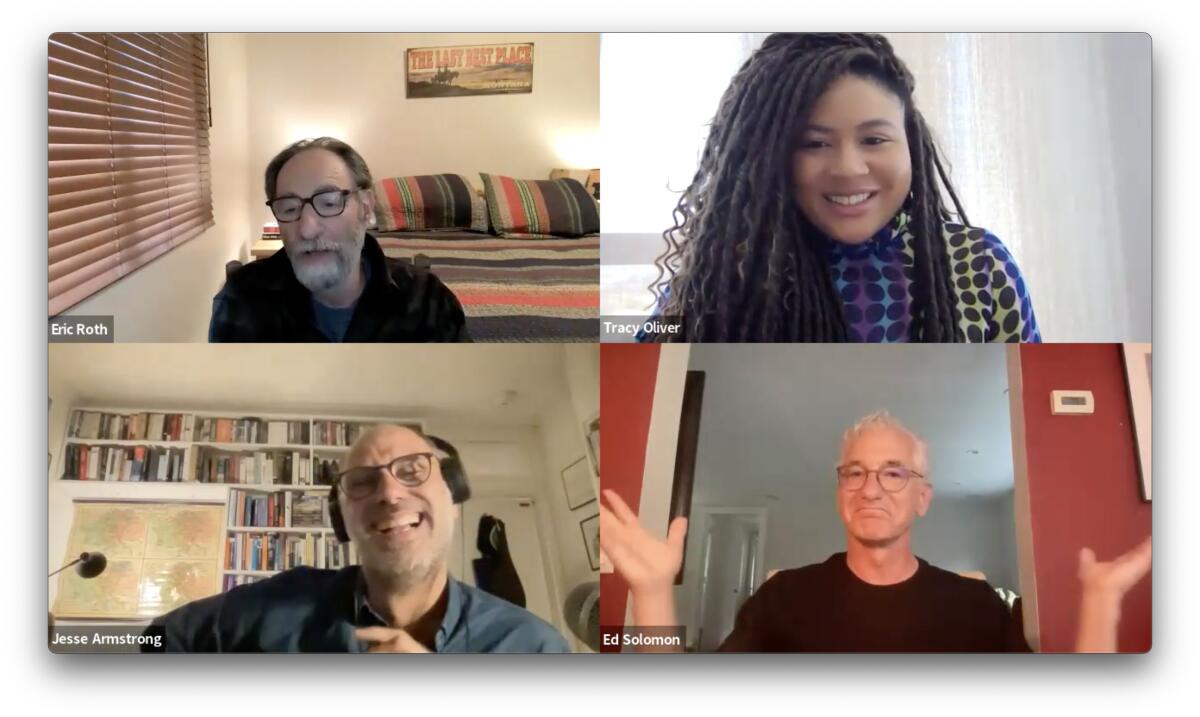
From the outset, the goal of Word by Word was to go beyond the usual advice doled out to aspiring screenwriters.
“Our thing was, we don’t want this to be something that you could either read in a book or find better taught elsewhere,” says Solomon, who named the workshop in honor of Anne Lamott’s much-loved writing advice book “Bird by Bird.” “Really, it’s about trying to create access to the inner lives and inner processes of people whose work I admire and who are willing to share it.”
The Word by Word workshops have offered plenty of practical tips and hard-earned wisdom about the craft. (The second half of each two-hour session is devoted to questions from the audience.)
Riley, who wrote and directed “Sorry to Bother You,” detailed his daily ritual of writing from 6 to 10 a.m. daily on a laptop with no internet connection to prevent distractions. McQuarrie, whose recent credits include “Top Gun: Maverick” and “Mission: Impossible — Dead Reckoning Part One,” emphasized the importance of tethering expository dialogue to character conflict to avoid boring an audience, explaining, “Information is the death of emotion.”
With little in the way of formal structure and often surprising guest pairings, the conversations frequently veer in unexpected directions. Paired with Abrams on a recent episode, Apatow recounted the inauspicious beginning of his own filmmaking career: dropping out of USC film school after he won “The Dating Game” so he could collect his prize of a trip to Acapulco. In the same episode, Solomon revealed that in his younger years he and some friends had once stolen a Newsweek magazine featuring Burt Reynolds on the cover from Reynolds’ own mailbox, only to return it later out of a sense of guilt.
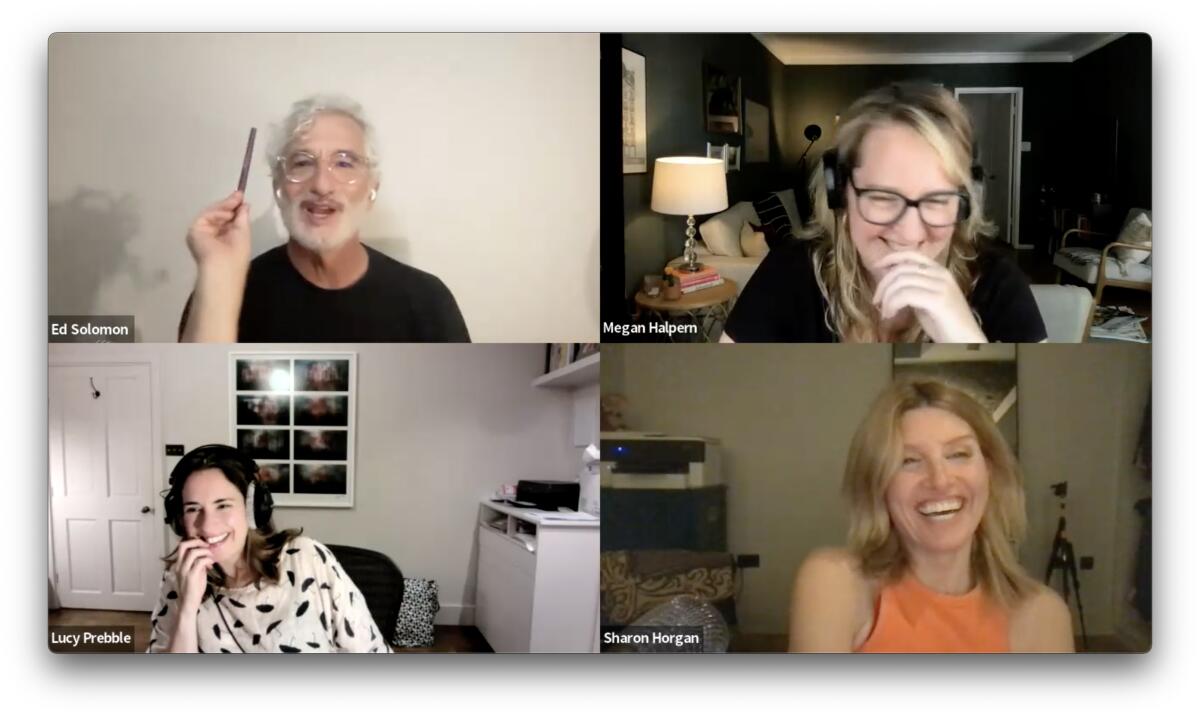
At one point during her episode with McQuarrie, Schumer’s 4-year-old son crawled onto her lap and told a joke. “Have you seen the new pirate movie?” he asked McQuarrie. “It’s rated Arrrr.”
“People are seeing something they haven’t seen before,” says Halpern, who runs the Black List’s screenwriting lab program. “When you’re paired with someone unexpected, it’s a really easy way to get into unexpected conversations so it doesn’t just feel like you’re listening to the same stories and the same advice that they’ve given before. It allows them to have a little bit more wiggle room.”
Perhaps not surprisingly, the psychological torment of the blank page and the fear of failure have been frequently recurring themes on Word by Word. Kaufman, who won an original screenplay Oscar for “Eternal Sunshine of the Spotless Mind” and is one of the industry’s most revered writers, spoke of his own relentless inner critic. “I have a lack of confidence,” he said. “Whenever I embark on something new, it’s a struggle.”
SAG-AFTRA has approved a deal from the studios to end its historic strike. The actors were on strike for more than 100 days.
Solomon says that shared sense of self-doubt and creative angst, no matter whether one has written a hit movie or series or just aspires to someday, is a key part of Word by Word’s appeal.
“One of the most heartening things about this is how much people who are earlier in the trajectory of their careers feel validated by the fact that they can see themselves in these guests,” says Solomon, who most recently created the Max limited series “Full Circle,” his third collaboration with director Steven Soderbergh. “We’ve had some remarkable people on, and not one person feels like they’ve got their s— together. Everyone feels like they’re still learning the craft.”
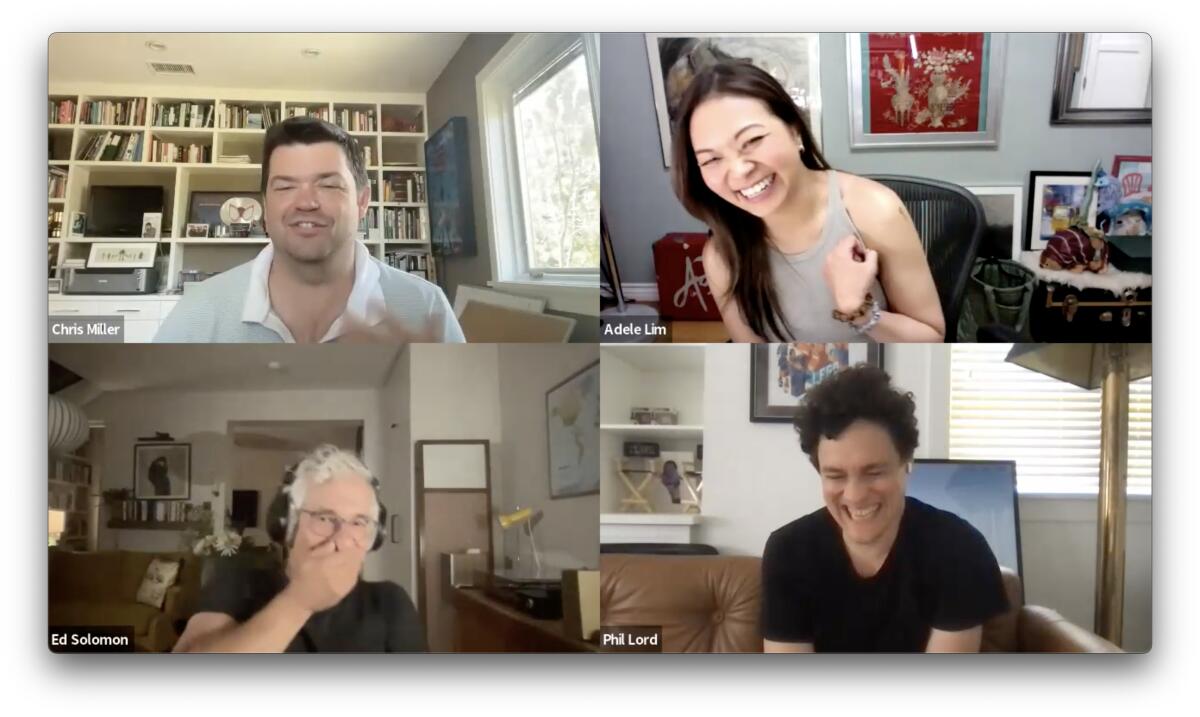
With no end in sight for Hollywood’s historic double strike, Solomon and his Black List partners are continuing to book weekly episodes; upcoming guests include Ben Stiller, Patton Oswalt, Spike Jonze, Janicza Bravo, Callie Khouri and Sarah Silverman. “We haven’t had hesitation from anyone,” says Solomon. “Everyone has been like, ‘How can I help?’”
Looking beyond the strike, the team behind Word by Word are planning to keep the series going once everyone gets back to work. “It may be a bit more intermittent once the strike ends, because scheduling will get more difficult, but continuing this in some form after the strike is a no-brainer for us,” says Leonard. (An announcement is coming soon on making previous episodes available.)
Solomon sees the series eventually expanding beyond just writers to include guests from other creative fields, while still sticking to its mission to raise funds to support the entertainment community.
“I think you could substitute any art form for writing in these conversations,” he says. “Writing a song, building a piece of fine cabinetry, being an architect, dreaming up how to make a certain vintage of wine — I’m of the belief that there are more similarities among those than differences. The idea post-strike would be to continue to raise money for these funds, because they can and will be used in future work stoppages. So the more we can help, the better.”
Meanwhile, Solomon is getting all the creative stimulation he could have hoped for from any class and then some. “Getting to talk to amazing writers, you realize that there are so many different ways to approach the process,” he says. “You get so embedded in your own process that you forget that what you do is just habit that gets deeper and deeper and deeper. So having these conversations with people has really opened up my world in a way.”
More to Read
Inside the business of entertainment
The Wide Shot brings you news, analysis and insights on everything from streaming wars to production — and what it all means for the future.
You may occasionally receive promotional content from the Los Angeles Times.
